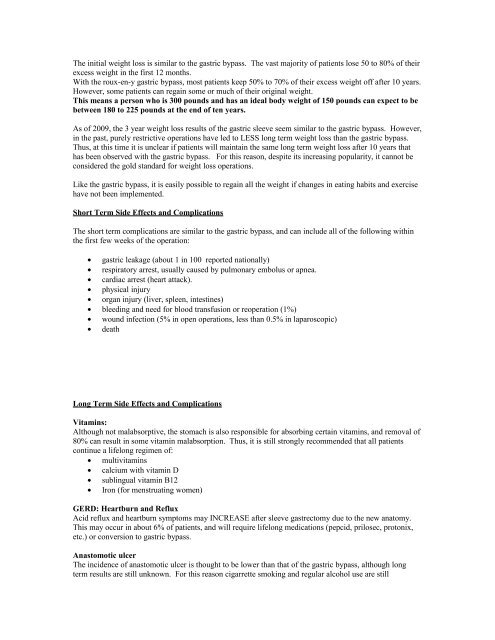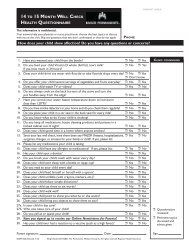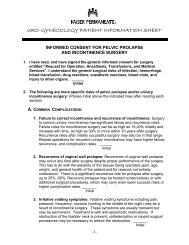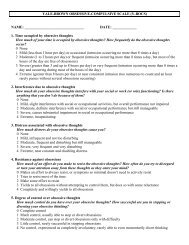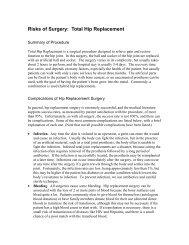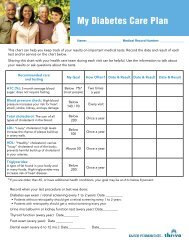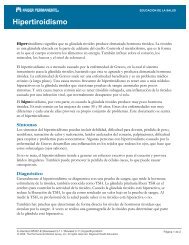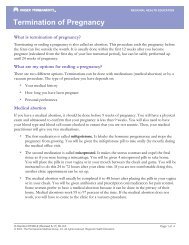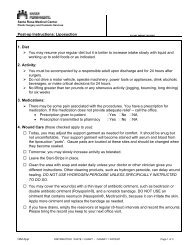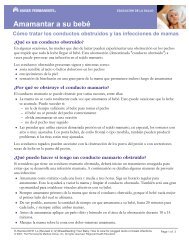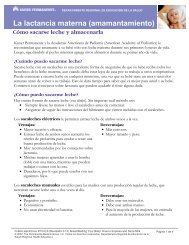Patient Information Book For Gastric Bypass Surgery - permanente.net
Patient Information Book For Gastric Bypass Surgery - permanente.net
Patient Information Book For Gastric Bypass Surgery - permanente.net
You also want an ePaper? Increase the reach of your titles
YUMPU automatically turns print PDFs into web optimized ePapers that Google loves.
The initial weight loss is similar to the gastric bypass. The vast majority of patients lose 50 to 80% of their<br />
excess weight in the first 12 months.<br />
With the roux-en-y gastric bypass, most patients keep 50% to 70% of their excess weight off after 10 years.<br />
However, some patients can regain some or much of their original weight.<br />
This means a person who is 300 pounds and has an ideal body weight of 150 pounds can expect to be<br />
between 180 to 225 pounds at the end of ten years.<br />
As of 2009, the 3 year weight loss results of the gastric sleeve seem similar to the gastric bypass. However,<br />
in the past, purely restrictive operations have led to LESS long term weight loss than the gastric bypass.<br />
Thus, at this time it is unclear if patients will maintain the same long term weight loss after 10 years that<br />
has been observed with the gastric bypass. <strong>For</strong> this reason, despite its increasing popularity, it cannot be<br />
considered the gold standard for weight loss operations.<br />
Like the gastric bypass, it is easily possible to regain all the weight if changes in eating habits and exercise<br />
have not been implemented.<br />
Short Term Side Effects and Complications<br />
The short term complications are similar to the gastric bypass, and can include all of the following within<br />
the first few weeks of the operation:<br />
• gastric leakage (about 1 in 100 reported nationally)<br />
• respiratory arrest, usually caused by pulmonary embolus or apnea.<br />
• cardiac arrest (heart attack).<br />
• physical injury<br />
• organ injury (liver, spleen, intestines)<br />
• bleeding and need for blood transfusion or reoperation (1%)<br />
• wound infection (5% in open operations, less than 0.5% in laparoscopic)<br />
• death<br />
Long Term Side Effects and Complications<br />
Vitamins:<br />
Although not malabsorptive, the stomach is also responsible for absorbing certain vitamins, and removal of<br />
80% can result in some vitamin malabsorption. Thus, it is still strongly recommended that all patients<br />
continue a lifelong regimen of:<br />
• multivitamins<br />
• calcium with vitamin D<br />
• sublingual vitamin B12<br />
• Iron (for menstruating women)<br />
GERD: Heartburn and Reflux<br />
Acid reflux and heartburn symptoms may INCREASE after sleeve gastrectomy due to the new anatomy.<br />
This may occur in about 6% of patients, and will require lifelong medications (pepcid, prilosec, protonix,<br />
etc.) or conversion to gastric bypass.<br />
Anastomotic ulcer<br />
The incidence of anastomotic ulcer is thought to be lower than that of the gastric bypass, although long<br />
term results are still unknown. <strong>For</strong> this reason cigarrette smoking and regular alcohol use are still


